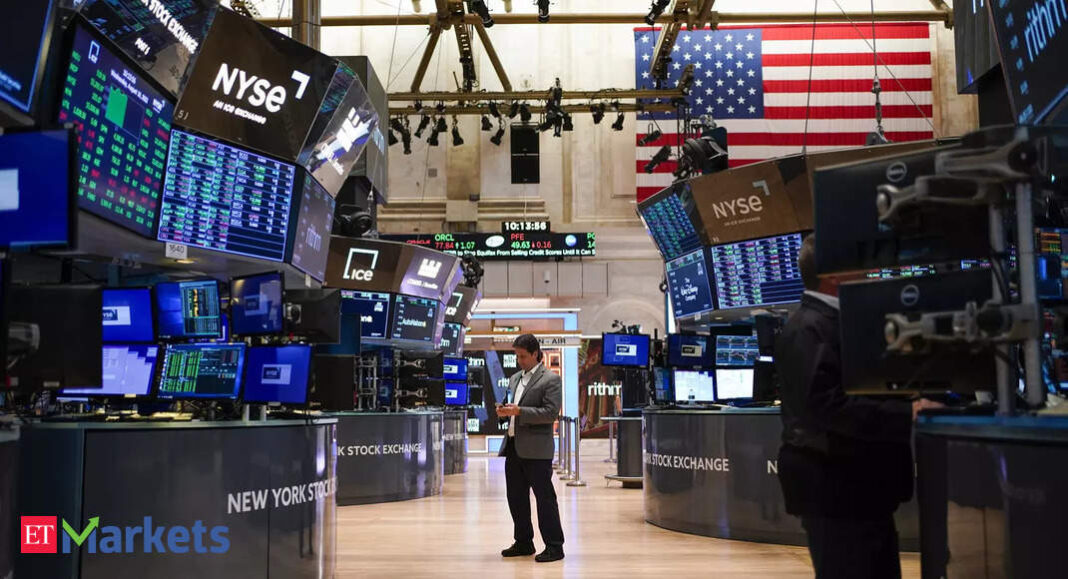U.S. stock indexes fell on Monday, led by shares of Tesla and other megapcap companies, as investors feared that the Federal Reserve’s monetary policy tightening campaign could push the U.S. economy into a recession.
The main U.S. benchmarks have sold off sharply in December, putting them on course for their worst annual declines since the 2008 financial crisis, after mixed economic data and the Fed’s hawkish stance fueled worries of a recession.
Market heavyweights such as Apple Inc, Microsoft Corp and Amazon.com Inc fell more than 1% on Monday, weighed down by rising Treasury yields.
Tesla Inc fell 1.6%, reversing strong premarket gains in the wake of a Twitter poll that showed majority of users voted for Elon Musk to step down as chief executive of the social media platform.
“There’s residual negativity from the Fed’s more hawkish comments, concerns about where interest rates are going to end up next year and what that is going to do to valuations,” Michael James, senior vice president of institutional equity trading at Wedbush Securities.
“When people adjust their expectations after the Fed meeting, higher rates typically imply more compressed multiples for growth stocks.”
The benchmark S&P 500 and the tech-heavy Nasdaq lost over 2% each last week after Fed Chair Jerome Powell signaled more policy tightening, and the central bank projected that interest rates would top the 5% mark in 2023, a level not seen since 2007.
Further, hawkish messages delivered by three Fed officials including New York Fed President John Williams last week underscored the U.S. central bank’s determination to do what it takes to ease price pressures.
Still, money market participants are pricing in 61% chance of a 25 basis points rate hike in February to 4.5%-4.75%, with a terminal rate of 4.84% in May 2023.
Data on the labor market and inflation this week will set the investor mood, providing more clues on future rate hikes by the central bank.
At 12:27 p.m. ET, the Dow Jones Industrial Average was down 76.26 points, or 0.23%, at 32,844.20, the S&P 500 was down 23.98 points, or 0.62%, at 3,828.38, and the Nasdaq Composite was down 133.19 points, or 1.24%, at 10,572.22.
Seven of the 11 major S&P sectors were lower, with consumer discretionary, communication services and technology leading losses.
Meta Platforms fell 2.9% after the European Commission said it could impose a fine of up to 10% of the tech conglomerate’s annual global turnover if evidence showed an infringement of the EU’s antitrust laws.
L3Harris Technologies Inc lost 3.3% after the U.S. defense contractor said it would buy hypersonic engine manufacturer Aerojet Rocketdyne Holdings Inc for $4.7 billion. Aerojet added 1.6%.
Shares of casino operators Melco Resorts & Entertainment , Las Vegas Sands Corp and Wynn Resorts fell in the range of 1.5% to 10.5% after Macau said on Friday six casino firms will invest around $15 billion as part of new 10-year contracts they signed to operate in the world’s biggest gambling hub.
Declining issues outnumbered advancers for a 2.10-to-1 ratio on the NYSE and 2.35-to-1 ratio on the Nasdaq.
The S&P index recorded five new 52-week highs and 15 new lows, while the Nasdaq recorded 42 new highs and 335 new lows.
(What’s moving Sensex and Nifty Track latest market news, stock tips and expert advice on ETMarkets. Also, ETMarkets.com is now on Telegram. For fastest news alerts on financial markets, investment strategies and stocks alerts, subscribe to our Telegram feeds.)
Download The Economic Times News App to get Daily Market Updates & Live Business News.



